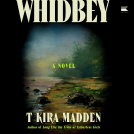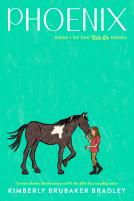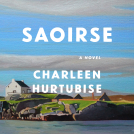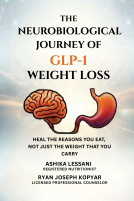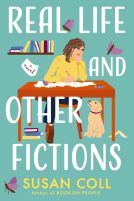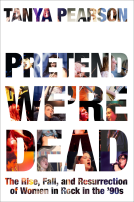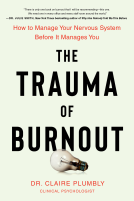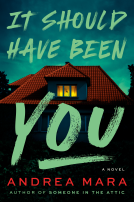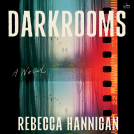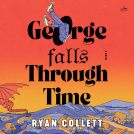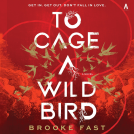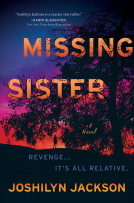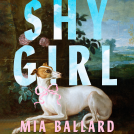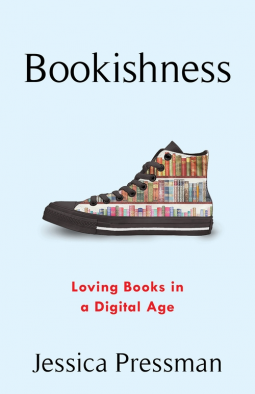
Bookishness
Loving Books in a Digital Age
by Jessica Pressman
This title was previously available on NetGalley and is now archived.
Send NetGalley books directly to your Kindle or Kindle app
1
To read on a Kindle or Kindle app, please add kindle@netgalley.com as an approved email address to receive files in your Amazon account. Click here for step-by-step instructions.
2
Also find your Kindle email address within your Amazon account, and enter it here.
Pub Date Dec 01 2020 | Archive Date Mar 10 2021
Talking about this book? Use #Bookishness #NetGalley. More hashtag tips!
Description
In Bookishness, Jessica Pressman examines the new status of the book as object and symbol. She explores the rise of “bookishness” as an identity and an aesthetic strategy that proliferates from store-window décor to experimental writing. Ranging from literature to kitsch objects, stop-motion animation films to book design, Pressman considers the multivalent meanings of books in contemporary culture. Books can represent shelter from—or a weapon against—the dangers of the digital; they can act as memorials and express a sense of loss. Examining the works of writers such as Jonathan Safran Foer, Jennifer Egan, Mark Z. Danielewski, and Leanne Shapton, Pressman illuminates the status of the book as a fetish object and its significance for understanding contemporary fakery. Bringing together media studies, book history, and literary criticism, Bookishness explains how books still give meaning to our lives in a digital age.
Advance Praise
"Fizzing with ideas and sparkling with finds, this analysis of the digital age’s love affair with print shows Pressman’s keen eye for the paradoxes of contemporary cultural practices. " —Leah Price, author of What We Talk About When We Talk About Books: The History and Future of Reading
Available Editions
| EDITION | Other Format |
| ISBN | 9780231195133 |
| PRICE | $30.00 (USD) |
Average rating from 34 members
Featured Reviews
 John L, Reviewer
John L, Reviewer
Recently, during one of the coronasniffles outbreaks here in the UK, university students were confined to barracks, unable to attend libraries, lectures, societies, pubs or anything else they may have been concerned with. An image of a complaint about that situation went viral, but nobody seemed to bat an eyelid that behind the sign was another – a collection of large bottles of cheap white cider – ten or twelve litres of it; at least a week's supply. It seemed accepted that undergrads would be necking this stuff in large quantity, and the brand spoke volumes. But contrast that with their professors, perhaps asked to yack on about something in the media – they wouldn't be squatting alongside their drinks cabinet with its top brands. No, they'd be perched in some form of study in front of a thousand books, just in case we didn't think they were astute or academic enough to be worth our attention. The amount, and some visible titles, are what matters here, and perhaps organisation and layout, as branding in books seldom exists beyond Penguin colours. These moving 'shelfies' would never have been possible if all those complaints about the death of the book had come about. Yes, this book is designed to highlight how we still engage with book-type books, and how so many people rely on displaying them, and otherwise connecting with them, to sell themselves to the world just as the students used their choice of tipple. With ebooks a most unlikely way to do that, clearly the medium is still the message.
Our next two chapters here might be some ideal choices for talking heads backgrounds – novels that advertise the attributes of books, and all that they mean and all that they can do. The spoiler-high content here certainly reduces a few interesting-sounding volumes to mere background for those of us yet to read them. But beyond that the book continues on that furrow – merely discussing a few select titles, and doing it well, but (a) not in a friendly-for-the-general-bus-commuter manner, and (b) not really in a convincing manner. I thought this would be how we still engage with that bit of stiffened outer (perhaps with a paper surround), and all the pages within, but it wasn't really a cultural history of the book as is, circa 2020, but a literary criticism of a rarefied few volumes that prove in their own sweet ways that books as a medium have to exist in order to allow for their very existence.
Hence a Safran Foer article, a mere snip (pun intended) at £100 on amazon, that allegedly takes an echt book and sends robot-formed holes down through its pages, cutting out words, creating artificial pauses and new meanings and creating a new text. Hence books that come with stuff, such as S, by (sic) J J Abrams. Hence the chapter I looked forward to most, once I knew to expect it, about House of Leaves. But this book tells me that, because I read it without signing up for the official soundtrack CD, and looking at the website (at a time I was not yet online), I didn't read it correctly, and in fact it's not a most meta and most wonderful ghost/horror story, but a riposte to the 'end of the book' brigade, and all their ironically online screeds.
None of those selections above convinced, as I say, for different reasons – the Safran Foer claims something that's bloody obvious about his book to be almost a twist unforeseen, the S content accurately claims the connections between the item and these pages' ethos as artifice, and the Danielewski was an inevitable let-down. I thought this would be akin to one of those Bloomsbury "Object Lessons" books – those I routinely describe as being about something you'd never find yourself reading about. This, with its high-falutin' academic style, is not something you'd probably find yourself reading about. It aimed at too few targets, and while hitting them didn't make a full quiver, or whatever the heck my allegory is trying to say. Nowhere here is an engagement with how the hoi polloi still like their books – the weight stopping their poolside towel from blowing away, the faux-antique shelves of plastic in pubs about two years old, the hollowed-out Ali Smith hardback I found as a jewellery safe in one job lot of book stock I bought a year or three back. What we have is reasonable, if you're in academe, and can agree that about a dozen entities makes an ethos, and that hypothesis, method, conclusion can be had from so little data. Me, I'm down the corner shop for some 9% cider.
Meh! this was okay. I was really hoping for more considering the subject matter.
I had a hard time finishing this one. I just could not get into the writing.
'Bookishness' provides an analysis of the construction of the physical book as a symbol within a rapidly changing digital world. The book provides insightful thoughts into the commodification of bookish objects across social classes and provides an interesting discussion of consumption patterns. The book also assessed 'bookish artefacts' and the realms within which the physical book has managed to infiltrate, which I found evoked an interesting consideration of consumerism. I found this book to be extremely accessible, with clear examples, anecdotes and analysis. The author provides a wealth of knowledge and her tone shines through. It is clear to see the author takes a personal interest in this topic and not just a professional one.
This book is very much grounded in the literature, with most of the analysis stemming from the study of books. Whilst this narrative makes sense and provides a convincing argument, I had hoped when reading the description of this book that it would draw on literature from social sciences, in particular anthropology. Despite this, I still found 'Bookishness' to be incredibly interesting and think everyone within the book community should read it.
I look forward to reading more from Jessica Pressman and will 100% be exploring this topic further.
***Thanks to the publisher and NetGalley for providing me with a copy of this book in exchange for an honest review***
This is the perfect book for a librarian who understands the passion of reading! I loved the pictures - they added more depth and dimension to an interesting read.
 Media/Journalist 144784
Media/Journalist 144784
ARC for review. EPD - 12/1/20.
In this digital age when we no longer need the physical object of a book to read, what about us craves the "symbol, art form and artifact?" The book is divided into sections, first taking a look at objects, from "high art to absolute kitsch" (paintings of beautiful libraries around the world to a <i>Pride and Prejudice</i>duvet cover).
Pressman also examines attitudes toward reading and books, noting that surveys from the Census Bureau in 2002 report that for the first time in modern history fewer than half the adult population in America reads "literature" (I'm surprised it was even close to fifty percent and wonder if people weren't lying. I'm also wondering what sort of census forms other people are getting and why I never get asked any good questions.). Anyway, depressing, and I only imagine those numbers are continuing to sink like a stone.
There's also a discussion about books about books and libraries and a full chapter about two books, one of which is one of my all time favorites, <u>House of Leaves</u>, as these are two books written in experimental style (<u>The Raw Shark Texts</u> is the other. I have read both of these.) so as to be books that are...should we say self aware about being books? In a way. Difficult to explain if you haven't read them.
The book is from the Columbia University Press, which should alert you that it's an academic text, not a fun text with lots of photos of various book products (there are a few), so if that's what you are looking for, look elsewhere. However, if you are fascinated the the two books above and similar books (<u>The Ice-Bound Concordance</u>, <u>S.</u>, etc...and I am), as well as Jonathan Safran Foer's <u>Tree of Codes</u>< which sounds terrible to me), this might be worth a bit of your time.
Very interesting academic take on bookishness, relatively easy to read but not really geared towards the average reader. Some of the chapters have a heavier focus on specific books, and you might want to read those before you get to this one afterwards - not having read them made it much harder to follow the author's reflection.
I love everything bookish. I enjoyed how writer has explained the conflict of physical books and ebooks. I liked all the pictures and how books are just a reading material it's much more than that. Being bookish is lifestyle. And I am proud to be the bookish.
BOOKISHNESS by professor & literature scholar Jessica Pressman sits at the intersection of academia and bookstagram. on bookstagram, the term ‘bookish’ describes activities, merchandise, or even people that/who revolve around books. I felt delighted to discover — thank you Netgalley — that this academic scholar takes bookishness seriously through an analytical, scholarly & theoretical lens. her research question was essentially how/why did representations of physical books persist into a digital or even post-digital era. Pressman contends that the culture of ‘bookishness’ deserves serious consideration owing to its significance for how people discover each other & themselves through books. according to Pressman, through bookishness & bookish representations, readers feel understood & known and connect w/ a community of readers. notable quotations & nuggets of wisdom are abundant i.e. “I want books around and want to feel all the feelings of having them near, for the interchange of attachments is part of how I recognize myself.” this idea takes on increased significance after audio & especially electronic books are widely available. while a hobbyist bookstagrammer might feel unamused by academic jargon like a scholar might think they’re above the industry of bookishness (spoiler: they’re not), both hobbyist & scholar will finish Pressman’s book taking bookishness seriously.
Reading Bookishness, a book which depicts the obsolescence of books in the conventional sense through the screen of my Kindle is a funny way to observe how 'bookishness' as Jessica Pressman terms it slowly affects our day-to-day life in the twenty-first century. The question remains, “When we are reading through our digital devices, e.g. our laptops, smartphones, tablet PCs, Kindles, are we really reading?” With the rise of new media and digital culture, the paradigm of reading has shifted from gazing into a collection of papers bound to a hardback, into scrolling in between pages cramped with blue-coloured hyperlinks here and there throughout the internet.
With no puns intended, the author happens to have a surname close to the sense of bookishness. Pressman indicates the labourer in the print shop who maintains the printing press. So much has changed in the printing industry ever since Gutenberg invented the first printing machine in the late fifteenth century. Mrs Pressman tries to assert her view in this book that digital media is not always bringing danger to the physical form of books. We have long forgotten how in the sixteenth century, Martin Luther was greatly benefited in reforming churches in Europe by the existence of Gutenberg’s printing machine which helped him to spread his first German-translated Bible edition and his other writings related to the practice of selling indulgences of the Roman Catholic Churches. Even the book itself was once a 'new media', which was initially viewed as a threat to order in medieval Europe.
Mrs Pressman provides careful analyses on the 'bookishness' phenomenon which happens as part of the cultural shift to the new media. There are anxieties that present with the way digital media started to replace our mode of interaction with the act of reading, in which the death of books as the ever-present challenge to be conquered. She provides us with cultural analysis through the spectrum of recent literary works which depict the notion of 'bookishness', such as Robin Sloane’s 'Mr. Penumbra's 24-Hour Bookstore' which brings the central goal of bookishness through the depiction of books as a place to take refuge from the encroaching digital world that keeps surrounding us today. The anxieties as shown by several authors whose works she commented are discussed in details here, while also countering the general assumption of 'digital media replacing physical books'.
We forget that even several centuries ago, to be able to own hardbacks and have leisure time to read books are privileges exclusively held by the higher caste of the social stratum. The increasing efficiency of book production, the introduction of cheaper paperbacks and also the increase of literacy rate have contributed to book-forms to be more accessible to more people. We begin to take for granted these facts, while also the awareness of threats to conventional books posed by digital media contributed a lot to the 'bookishness' phenomenon. Mrs Pressman presents various examples in this book on how we begin to incorporate many both animate and inanimate objects to our daily life in order to feel more intense 'closeness' to the physical presence of books, by using objects such as book-shaped keychains, fake-book imageries, etc. It is interesting to read the author’s research which poses this phenomenon not as a dangerous threat to physical books, but rather as a complementary part of the cultural shift to digital media.
Her analysis also reflects on how we should face the never-ending pours of information through our digital media which keeps us connected 24 hours to the internet during this smartphone era. With physical books, at least we understand how it works. We could simply turn the pages from front cover to back cover. With the rise of Google and ever-more friendly user interface in our digital platform, the less we understand how the technology works. It illustrates clearly how we should view digital media and digital literacy in general, on how we should treat the way we acquire information that we digest every day. All in all, Mrs Pressman tries to present this phenomenon as part of fetishism towards the physical form of books. When digitisation threatens the physical version of books, there will be this reaction to fetishes it as an object.
Cannot say that I fully agree on the obsolescence of physical books. Even though I read some of my books on my Kindle and laptop, I would still prefer to read my books in paperbacks that I could smell and touch. There are also the benefits of the physical presence of books, that would be easily lent to my friends and discussed rather than e-books. It gives me a chance to exchange view with someone whom I happened to see reading similar books that I have read before or to take a glance into someone else’s private bookshelves to encounter if we have any similarities. Maybe I am part of the old-school conservatives in this sense, but we could not deny the fact that digital media has slowly transformed our interaction with books. Even though Mrs Pressman’s book is written in the academic style, it is a wonderful appreciation of the cultural shift through this 'bookishness' phenomenon and a hopeful reminder on how we should view digital literacy.
I was expecting this to be a love letter to books and to go into the benefits of books versus reading on a device. However, this was more of a history lesson and was boring at spots.
 Bill C, Reviewer
Bill C, Reviewer
Bookishness: Loving Books in a Digital Age, by Jessica Pressman, has a solid core of analysis at its center, as she explores the way books, and how we feel about them and read them, has changed (or not) in our digital culture. But I often found myself wishing she’d gone deeper or more fully into particular areas.
For instance, in one section she talks about how the imagery of pre-digital books is coopted in our modern world or fetishized (using the more anthropological meaning and not the pop culture more sexual one) via Jane Austen book spreads or the iBooks bookshelf icon etc. That seemed ripe for a deeper dive into Steve Job’s insistence on that sort of skeuomorphism, as it’s called, and how that was a battle that skeuomorph proponents won early on in the early digital but that they more recently have been losing. There were several other sections that seemed ripe for further discussion.
On the flip side, some might find that her close readings of several novels might go into too much detail, dependent on how familiar they are with the books, or at least the authors and their themes. For instance, she performs extended analysis Mark Z. Danielewski’s House of Leaves and Steven Hall’s Raw Shark Texts as allegories for the “deeply felt sense that the digital is changing our lives in unforeseen and unfathomable ways, and they position the book . . . as a kind of weapon against disembodied data.” She does a similar analysis of Jonathan Safran Foer’s Tree of Codes, whose story is too complex to go into here but suffice to say is probably more “art” or “sculpture” than it is “book.” Pressman does a good job of concisely summarizing and then explaining the books (at least the first two, which I’ve read, I can’t say for sure regarding the Foer), but those sections would certainly be more fully appreciated by those who are familiar with the works.
Beyond Foer’s product, she also looks at actual book sculptures, as well as stop action films and the entire fields of book kitsch and book “fakery” as she calls it. There again, in our desire for a nostalgic return to the days of yore with “real” books (she notes that distinction doesn’t make much sense and does a good job of explaining why), I wouldn’t have minded more cultural analysis. The same for the ways in which books have always been markers for class and other hierarchical distinctions, though really that’s just complaining Pressman didn’t write the book I wanted but instead the one she did, which is hardly a valid criticism.
The one thing I will say is that this is more of an academic lit-crit or social crit book, and I wouldn’t be surprised if a lot of people see its cover and blurb (“loving books in a digital age”) and expect a more casual, more pop culture/memoir-ish kind of work only to find themselves disappointed at best and at sea at worst. But if you know what you’re getting into, it’s an interesting exploration, if somewhat of a tease.
Being a bookseller I love reading books about books. I have a weird obsession to collect them. And as someone who loves books in all their forms, I thought this would be a really interesting title. But it just didn't capture my interest at all.
 Jillian C, Educator
Jillian C, Educator
Thanks to Netgalley for the gifted copy in exchange for an honest review!
This academic book seeks to delve deeper into what is a book? How does the digitization of our culture change what a book looks like and acts like? The author really shined when discussing book art made from books, and how the book has operated throughout history, giving power to the people who read and learn from it. At times, specifically with some of the more avant- grade examples from the last decade or so, the author seems to get too detailed and lost my interest. Overall, I really enjoyed a lot of the argument presented and it made me think a lot about bookishness and why I myself love and want to be around books
Overall, fun for any literary addict! It really delves into the academic qualities of loving books and bookishness. Sometimes the language did, however, get a bit heady and was hard to read quickly or while multitasking. I found I had to really focus as I read this book.
 Linda S, Librarian
Linda S, Librarian
BOOKISHNESS by Jessica Pressman is supposed to be all about "Loving Books in a Digital Age." I wish that Pressman, associate professor of English and comparative literature at San Diego State University, had been able to joyfully embrace all thing "bookish," but the content is not consistent with the rather whimsical cover. Instead, the tone and language employed is, to me, overly academic. Here is a small example: "This obsession with the materiality of books spans the spectrum from high art to absolute kitsch, and it signifies a culture grappling with its own increasing digitization." Understandable? Yes, but not an especially enjoyable or quick read. BOOKISHNESS may appeal to a more specialized audience interested in "literary culture," but general readers would likely be more apt to find it a very slow and somewhat unengaging read.
 Media/Journalist 204870
Media/Journalist 204870
Delighted to feature this title in the big Holiday Gift Books Guide lists - "Books for Book Lovers in year-end" for Zoomer magazine’s digital Books vertical. See link for full feature article and review.
Thanks to netgalley for the ARC in exchange for a fair and honest review. An interesting read, about how our love of actual books is being replaced with the convenience of digital books. Reading it (ironically on my Kindle) did get me thinking about how much I still love walking into bookstores and libraries and browsing and smelling the books despite 70% of the books I consume are now in digital format, more for convenience than anything else. This book had me reminiscing over how some of my most favourite of books I will always want to have in book form on my bookshelves just for the happiness and fond memories they give me. Whilst some of this book was spent discussing some books I wasn't familiar with, overall it's a great read for any book lover. ⭐⭐⭐#netgalley #tea_sipping_bookworm #goodreads #greatreads #bookishness #jessicapressman #bookstagram #bookqueen #litsy #amazonkindle
 Elle P, Librarian
Elle P, Librarian
This insightful look at the bookish life in the digital age may be a bit academic for some, but would be an excellent addition to collections where similar titles are popular.
This book was challenging for me to read as a digital ARC. There were so many visuals. I am eager to buy this book to see all the pictures. The idea of bookishness is an interesting one. Any one who loves books will find this intriguing. My husband jokes that I "play with my books" - I probably do :). So,,,,I love reading books about books and the people who love them.
I found the title and blurb misleading. This was a sometimes dry history about books and not what I expected it to be - a book about the love of books and bookish identities.
 Christine P, Reviewer
Christine P, Reviewer
I really enjoyed this insightful study of the concept of "Bookishness". Pressman goes for a deep dive into what it means to be "Bookish" in present day and how it developed into what some see as an obsession, others a personality trait, others a simple hobby. She skillfully and entertainingly addresses how reading became a cultural phenomenon, not just as an activity, but as a lifestyle. How is it that in an age where it was anticipated books would be set aside with the rise of the internet and digital media, that the sales of physical books around the world continue to thrive? What is it that keeps bringing us back to the scent and feel of book pages? The romanticism of trolling through libraries and quaint bookshops? What stimulated the eruption of media like "BookTube", a subsection of YouTube where book lovers Vlog their reads and photograph their bookshelves? Pressman evaluates the evolution of book history and approaches the question: Is ALL reading, reading? A fantastic read and mirror for any book lover.
I was provided with an electronic copy of Bookishness, by Jessica Pressman, by Netgalley in return for an honest review. I greatly appreciate the slightly ironic opportunity to review this title!
In Bookishness, Pressman outlines the fascination and continued interest in books in an age where we no longer need physical books to read.
I found this book creative and interesting! It's true that our love of books has not been eclipsed by technology in the digital age. It seems to only adapt and continue to manifest in our collection of books and bookish products.
This book provided intriguing commentary on the love of books that continues to persist today, and I really enjoyed reading through it!
Thank you to the publisher and to NetGalley for this ARC in exchange for an honest review.
a sharp collection of essays about the place of the book in today's digital society that requires more than one read to fully appreciate the extent of the author's analysis.
this book was quite clearly written by an academic for other academics. as such, there were times that i, an academic but not in the literary field, wanted to roll my eyes at the conclusions drawn about a particular line of a particular page in a particular book and what that says about bookishness as a whole. however, there were also several lines i wished i could underline and come back to to reflect upon more.
i was originally drawn to this book because of the promise of its subtitle: "loving books in a digital age." as someone who watches booktube videos from time to time, i have noticed the heightened commodification of the appearance of reading in the book hauls and subscription box unboxings in the more popular channels. "bookishness" presented me with some of the analysis i was searching for, but also went far beyond what i was expecting. i think i would need to reread this book at least once, preferably with a bookclub or literary scholar on standby to fully process the material.
overall, i enjoyed my time with "bookishness," though due to its density i had to spread out reading it over a couple months. while i do not fully agree with all of pressman's scholarly conclusions, i did learn a significant amount and was presented with an abundance of thought-provoking tidbits about the history of books, their presence and purpose in society, and how it has changed as technology has advanced.
thank you to netgalley and columbia university press for an e-arc in exchange for an honest review.
 Kristin J, Reviewer
Kristin J, Reviewer
Bookishness is a work most suitable for academics within literature and/or English due to the density and deep analysis, but as I have a major in English, I wasn't that intimidated by the book. It's also clear that the author knows her stuff, but I may disagree with her on certain topic/conclusions.
 Makenzie E, Reviewer
Makenzie E, Reviewer
I received a copy of this ebook in exchange for an honest review
This was quite an interesting book. I enjoyed the pictures immensely
 Bookseller 717502
Bookseller 717502
This book is an interesting read for those who would like to read scholarship in an accessible way. While the content is intelligent and illuminating, it also is engaging and relatable.
I live books and I love to read but I just haven't been able to connect with this book enough to want to finish it. I've tried a few times now and can't get very far. The photos are fun to look through, but I found the text slow and I kept looking fur something else to read instead. I think for three right audience, this would be a good fit, but it just isn't for me.
Thanks to Columbia University Press and NetGalley for the eARC in exchange for my honest review.
Readers who liked this book also liked:
Ryan Kopyar, Ashika Lessani
Health, Mind & Body, Self-Help

